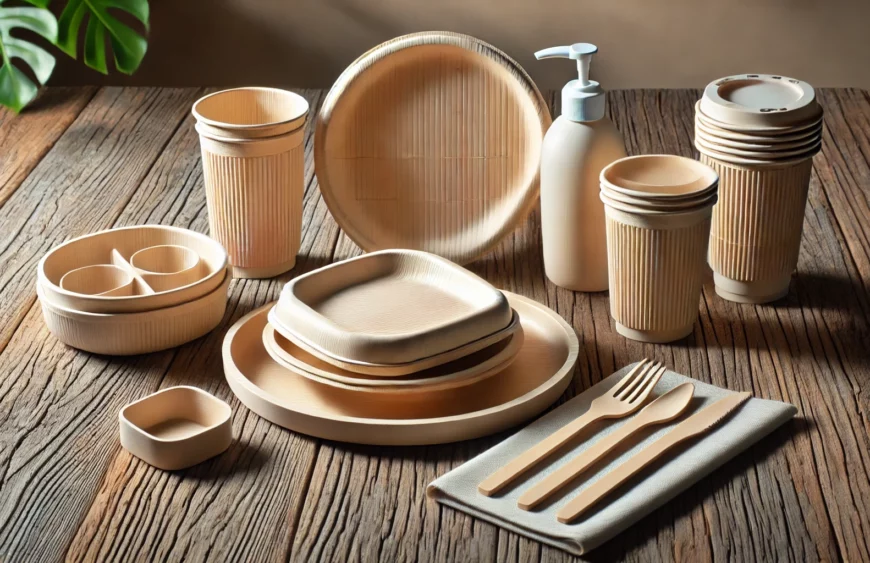Eine neue biologisch abbaubare Alternative zu Plastik

Eine neue biologisch abbaubare Alternative zu Plastik: Besteck aus Zuckerrohr und Bambus baut sich in 60 Tagen ab
Forscher haben ein umweltfreundliches, biologisch abbaubares Geschirr aus Zuckerrohr und Bambus entwickelt, das sich innerhalb von nur 60 Tagen zersetzt. Im Gegensatz zu herkömmlichen Kunststoffprodukten, die bis zu 450 Jahre brauchen, um sich abzubauen, oder zu biologisch abbaubaren Polymeren, für deren Abbau hohe Temperaturen erforderlich sind, zersetzt sich dieses neue, ungiftige Material in einem Bruchteil der Zeit auf natürliche Weise. Es ist nicht nur nachhaltiger, sondern auch sauber genug, um Lebensmittel zu servieren - ideal, um Plastikbecher und Einwegbehälter zu ersetzen. Die Studie über dieses innovative Material wurde in der Zeitschrift Materie.
Von Plastik zu Bambus und Zuckerrohr: Eine nachhaltige Lösung
Julie, die leitende Forscherin von der Northeastern University, erzählte von ihrem Schock, als sie 2007 zum ersten Mal die USA besuchte. "Ich war verblüfft über die vielen Einweg-Plastikbehälter in den Supermärkten. Plastik macht das Leben zwar bequemer, erzeugt aber auch Abfall, der sich in der Umwelt nicht zersetzt", erinnert sie sich. Julie bemerkte, dass bei Konferenzen und Versammlungen immer mehr Plastikschüsseln, -teller und -besteck weggeworfen wurden, was sie zu der Frage veranlasste, ob es nicht nachhaltigere Materialien gäbe.
Auf der Suche nach einer Alternative zu Plastik erforschten sie und ihr Team Bambus und eines der wichtigsten Nebenprodukte der Lebensmittelindustrie: Bagasse (Zuckerrohrschnitzel). Durch die Kombination der langen, feinen Fasern des Bambus mit den kurzen, groben Fasern des Zuckerrohrbreis schufen sie ein dicht gewebtes Netz, das sowohl mechanisch stabil als auch biologisch abbaubar ist.
Stark, funktionell und biologisch abbaubar
Dieses neue "grüne" Geschirr hat sich als ebenso haltbar wie Kunststoff erwiesen und kann Flüssigkeiten aufnehmen, ohne jedoch die Umwelt zu belasten. Im Gegensatz zu biologisch abbaubaren Produkten aus recycelten Materialien, die möglicherweise nicht ganz frei von Tinte sind, beginnen diese neuen Behälter nach 30-45 Tagen im Boden zu zerfallen und lösen sich nach 60 Tagen vollständig auf.
Julie erklärt: "Die Herstellung von Lebensmittelbehältern ist eine Herausforderung. Wir brauchen mehr als nur biologische Abbaubarkeit. Das Material muss lebensmittelecht sein, eine gute mechanische Festigkeit im nassen Zustand aufweisen und sauber genug sein, um mit heißen Lebensmitteln wie Kaffee oder Mittagessen verwendet zu werden."
Um die Wasser- und Ölbeständigkeit der Behälter zu verbessern, fügte das Team Alkylketendimer (AKD) hinzu, eine umweltfreundliche Chemikalie, die in der Lebensmittelindustrie weit verbreitet ist. Durch diesen Zusatz wurde die Haltbarkeit der Behälter unter nassen Bedingungen erhöht. Das Ergebnis ist ein Produkt, das die im Handel erhältlichen biologisch abbaubaren Behälter in Bezug auf mechanische Festigkeit, Ölbeständigkeit und Ungiftigkeit übertrifft, einschließlich anderer Produkte auf Zuckerrohrbasis und Eierkartons.
Reduzierung von Kohlenstoffemissionen und Kosten
Ein weiterer wichtiger Vorteil dieses innovativen Geschirrs ist die drastische Reduzierung der Kohlenstoffemissionen. Bei der Herstellung werden 97% weniger CO2 emittiert als bei Kunststoffbehältern und 65% weniger als bei Produkten aus Papier oder biologisch abbaubarem Kunststoff. Während die Kosten für die Herstellung dieser Becher aus dem neuen Material bereits halb so hoch sind wie die von biologisch abbaubaren Kunststoffen ($2.333 pro Tonne gegenüber $4.750 pro Tonne), sind herkömmliche Kunststoffbecher mit $2.177 pro Tonne noch immer etwas billiger.
Julie glaubt, dass eine Lösung zur Verringerung des Einweg-Plastikmülls darin besteht, nachhaltigere, biologisch abbaubare Alternativen anzubieten. "Es ist schwer, die Leute davon abzuhalten, Einwegbehälter zu benutzen, weil sie billig und praktisch sind", sagt sie. "Aber ich denke, eine der besten Lösungen ist es, Einwegbehälter aus nachhaltigeren, biologisch abbaubaren Materialien zu verwenden.
Die Zukunft des umweltfreundlichen Geschirrs
Der nächste Schritt des Teams ist die Verbesserung des Herstellungsprozesses, um die Energieeffizienz zu erhöhen und die Kosten weiter zu senken, so dass dieses neue Material wettbewerbsfähiger als herkömmlicher Kunststoff wird. Diese innovative Entwicklung bringt uns der Verringerung unserer Abhängigkeit von Kunststoffen und der Schaffung einer nachhaltigeren Zukunft einen Schritt näher.
Durch die Konzentration auf umweltfreundliche Alternativen wie Bambus und Zuckerrohr bietet dieses neue Material eine vielversprechende Lösung zur Verringerung des Plastikmülls, die sowohl der Umwelt als auch unserem täglichen Leben zugute kommt.

